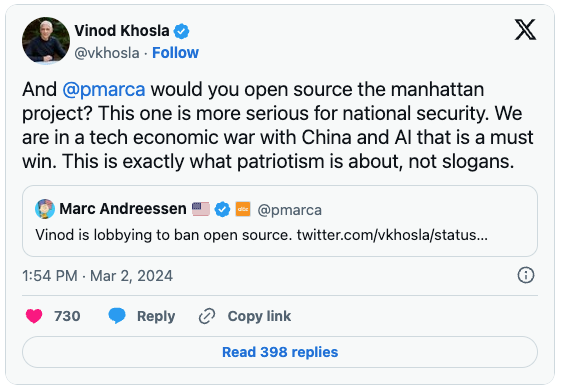The recent launch of Google AI, dubbed Gemini, has garnered significant attention, though for all the wrong reasons. For those not closely following the news, the launch proved to be a complete disaster, marred by criticisms of pervasive bias within the AI system. Truth became a casualty as facts about our country's founding, Vikings, and even the Pope were misrepresented. This bias wasn't limited to just one country; rather, it seemed to target leaders of nations whose narratives diverged from a specific ideological viewpoint (in this case, a very clear pro-liberal bias). This has sparked widespread conversation and criticism not only directed at Google but also at the broader AI landscape, encompassing companies like OpenAI and other tech giants based out of Silicon valley.
Amidst the outcry, there's been a lot of discussion on X around the monopolization of AI by a handful of tech behemoths, primarily situated in Silicon Valley or China. But the debates have been largely around open—source vs closed—source AI models where people have called for more level playing field for all kinds of models to thrive. But there's a notable absence of discussion around countermeasures — what product could we build or what technologies could we support to balance this monopolization force?
This is where "Read Write Own," a book penned by Chris Dixon, becomes a crucial recommendation.
Unlike many publications that could be condensed into mere tweets or blog posts, Dixon's work stands out for its relevance, depth, and meticulously researched insights. He offers practical tools and techniques, particularly in the realms of cryptocurrencies and blockchains, which he posits as antidotes to the prevailing AI landscape.
Chris goes into detail into the history and technical details of crypto but what attracted me to it was the political discourse around crypto vs Ai. Chris frames the political dichotomy surrounding AI and crypto as a fundamental struggle between centralization and decentralization, echoing Peter Thiel's assertion that "Crypto is libertarian, AI is communist." Within this framework, several thought-provoking themes emerge:
The Role of Artists in the AI Era: Chris prompts us to contemplate the evolving landscape for creatives in the face of AI advancements. He questions whether artists will continue to freely disseminate their content, considering the rise of deepfakes and the absence of robust identity management systems. While AI can potentially detect anomalies and unauthorized access, it also poses risks by generating fabricated content, exacerbating competition and threatening artists' livelihoods. Chris advocates for identity management solutions facilitated through crypto and blockchain to mitigate these challenges.
The Impact of "Take Rate" on the Political Debate: Examining the notion of "take rate," which refers to the commission charged by platforms for content publishing or transactions, raises pertinent questions about monopolistic tendencies facilitated by AI. Currently, giants like Apple levy significant fees, limiting creators' earnings. However, with the advent of Web 3.0 technologies and NFTs, creators stand to benefit from reduced intermediary layers, enabling them to retain a higher proportion of revenue. Crypto platforms like Rally, Mirror, and BitClout exemplify this shift, boasting lower take rates and empowering users and creators alike.
Crypto holds the promise of democratizing the digital economy by granting creators ownership over their content and facilitating fairer compensation structures, thereby challenging the monopolistic tendencies perpetuated by centralized platforms.




